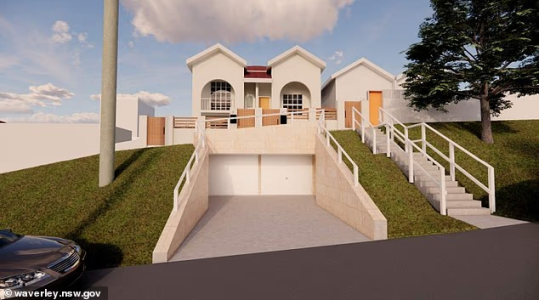You won’t believe why these Aussie homeowners were blocked from building their own garage
By
Maan
- Replies 0
Four Bondi families thought they had found a way to escape the chaos of street parking.
Instead, their plan unravelled in court, leaving them with hefty bills and no garage to show for it.
The reason behind the rejection has left many locals scratching their heads.
On Wilga Street in Bondi Beach, neighbours James and Jayshri Bullen and Nicholas and Ivana Seale teamed up with two others to propose a $940,000 underground car park beneath their homes.
They believed a shared dual garage would ease the daily battle of circling the block for a free spot, especially during the busy summer months.
But Waverley Council blocked the idea, arguing it conflicted with their policy of encouraging residents to rely on public transport instead of private cars.
The homeowners took the case to the NSW Land and Environment Court, only to lose again and be left with significant legal costs.
Mr Bullen insisted the plan made practical sense for families in the area.
‘We have jobs,’ he shared.
‘My wife works in Wollongong, and when you need to take your kids to sport on the weekend, the reality is you need a car.
‘Because we live close to the beach, it's a nightmare to find a park on the street, and on the weekends and during summer it becomes impossible.’
At one point, Mr Bullen claimed, a council employee even suggested they should move elsewhere.
Wilga Street was a local road lined with time-restricted parking on both sides, and a council survey confirmed demand was already at breaking point.
The report warned the project would remove one existing on-street parking space while creating disruption from deep excavation.
A council spokesperson said the court ruling matched its planning principles.
‘Under Waverley Council's Development Control Plan 2022, we encourage the use of alternative modes of transport in areas well serviced by public transport, which represents all of the Waverley LGA,’ they said.
The council also argued the excavation would harm the streetscape, reduce deep soil for tree planting, and limit future infrastructure for pedestrians and cyclists.
Acting commissioner Amelia Thorpe agreed, saying the neighbours’ attempt to reduce impacts by sharing one driveway did not outweigh the damage.
‘The DA warrants refusal because the proposed excavation is excessive and would have adverse impacts on the streetscape, deep soil and on-street parking,’ she said.
‘I find also that the proposed development would be contrary to the public interest due to its inconsistency with council policy and controls to encourage walking, cycling and the use of public transport and to discourage the provision of private car parking.’
The decision divided Australians on social media.
‘The public benefit would be the removal of two plus cars taking space up on the street. So that's a net gain for the council,’ one person argued.
‘In theory yes, they should use public transport, but with no trains, and peak hour and weekend buses so crowded you can't get on them, I can see why they want to do this,’ another wrote.
Others, however, labelled the families entitled.
‘How entitled. If you wanted a house with parking that's what you should have bought. Can't imagine all the underground construction will be good for neighbouring homes,’ one said.
‘Plus it would set a precedent that allows other owners to do the same, thus removing more spaces. The council made the correct decision here,’ another added.
Some still sympathised with the residents, admitting that parking near Bondi Beach felt almost impossible.
If local councils are making rules about how people use shared spaces, it’s worth seeing how far they might go to enforce them.
Just as parking restrictions have sparked debate in Bondi, some leaders are now looking at regulating pedestrian behaviour in busy areas.
Here’s another real-life example of a council stepping in to manage public safety in everyday spaces.
Read more: Should we start fining phone users on footpaths? This mayor says yes!

Should councils put policy ahead of practicality when locals face daily parking nightmares?
Instead, their plan unravelled in court, leaving them with hefty bills and no garage to show for it.
The reason behind the rejection has left many locals scratching their heads.
On Wilga Street in Bondi Beach, neighbours James and Jayshri Bullen and Nicholas and Ivana Seale teamed up with two others to propose a $940,000 underground car park beneath their homes.
They believed a shared dual garage would ease the daily battle of circling the block for a free spot, especially during the busy summer months.
But Waverley Council blocked the idea, arguing it conflicted with their policy of encouraging residents to rely on public transport instead of private cars.
The homeowners took the case to the NSW Land and Environment Court, only to lose again and be left with significant legal costs.
Mr Bullen insisted the plan made practical sense for families in the area.
‘We have jobs,’ he shared.
‘My wife works in Wollongong, and when you need to take your kids to sport on the weekend, the reality is you need a car.
‘Because we live close to the beach, it's a nightmare to find a park on the street, and on the weekends and during summer it becomes impossible.’
At one point, Mr Bullen claimed, a council employee even suggested they should move elsewhere.
Wilga Street was a local road lined with time-restricted parking on both sides, and a council survey confirmed demand was already at breaking point.
The report warned the project would remove one existing on-street parking space while creating disruption from deep excavation.
A council spokesperson said the court ruling matched its planning principles.
‘Under Waverley Council's Development Control Plan 2022, we encourage the use of alternative modes of transport in areas well serviced by public transport, which represents all of the Waverley LGA,’ they said.
The council also argued the excavation would harm the streetscape, reduce deep soil for tree planting, and limit future infrastructure for pedestrians and cyclists.
Acting commissioner Amelia Thorpe agreed, saying the neighbours’ attempt to reduce impacts by sharing one driveway did not outweigh the damage.
‘The DA warrants refusal because the proposed excavation is excessive and would have adverse impacts on the streetscape, deep soil and on-street parking,’ she said.
‘I find also that the proposed development would be contrary to the public interest due to its inconsistency with council policy and controls to encourage walking, cycling and the use of public transport and to discourage the provision of private car parking.’
The decision divided Australians on social media.
‘The public benefit would be the removal of two plus cars taking space up on the street. So that's a net gain for the council,’ one person argued.
‘In theory yes, they should use public transport, but with no trains, and peak hour and weekend buses so crowded you can't get on them, I can see why they want to do this,’ another wrote.
Others, however, labelled the families entitled.
‘How entitled. If you wanted a house with parking that's what you should have bought. Can't imagine all the underground construction will be good for neighbouring homes,’ one said.
‘Plus it would set a precedent that allows other owners to do the same, thus removing more spaces. The council made the correct decision here,’ another added.
Some still sympathised with the residents, admitting that parking near Bondi Beach felt almost impossible.
If local councils are making rules about how people use shared spaces, it’s worth seeing how far they might go to enforce them.
Just as parking restrictions have sparked debate in Bondi, some leaders are now looking at regulating pedestrian behaviour in busy areas.
Here’s another real-life example of a council stepping in to manage public safety in everyday spaces.
Read more: Should we start fining phone users on footpaths? This mayor says yes!
Key Takeaways
- Bondi neighbours proposed a $940,000 shared underground garage to ease parking stress.
- Waverley Council rejected the plan, citing transport policy and environmental concerns.
- The NSW Land and Environment Court upheld the decision, calling the excavation excessive.
- Locals were split, with some supporting the families and others accusing them of entitlement.
Should councils put policy ahead of practicality when locals face daily parking nightmares?








